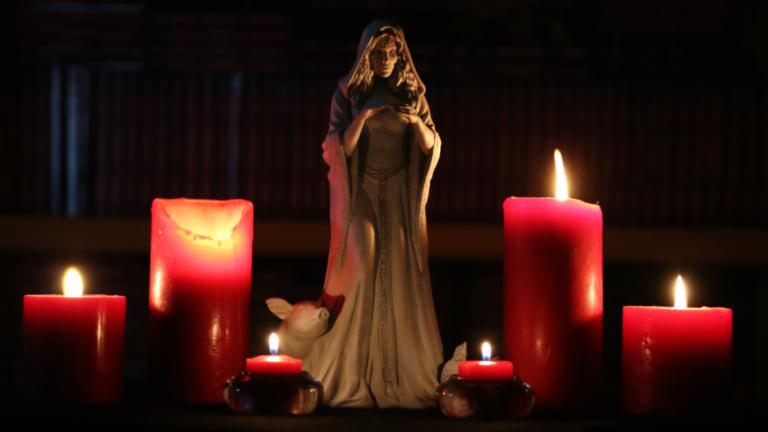How can we account for the different reports we get about the nature of certain deities? Do the Gods present Themselves in radically different ways to different people? What about the differences between people’s experiences today and what we read in the stories of our ancestors?
Here’s a question along those lines from the most recent Conversations Under the Oaks, edited for length:
Can the Gods change? Do they change?
I see debates where groups of people will argue over the personalities of the Gods they serve. One group says They’re harsh and demanding, while another group says They’re kind and nurturing.
Do some Gods soften over time? Are some people just misinformed? Plain wrong?
All experiences of the Gods are filtered through a human brain
Everything we experience, we experience through our senses, either physical or spiritual or both. But experiences are just raw data. They are meaningless until we interpret them: when we place them in context and determine what they mean. That process is called discernment.
Our experiences are always real. Our interpretations of those experiences are either more accurate or less accurate, more helpful or less helpful.
Two people can have an identical experience of a God and interpret it in two very different ways, based on their foundational assumptions, previous experiences, expectations, hopes and fears. Which is right – if either – is impossible to say with certainty.
But we can see how people respond to these experiences – how they relate to others, serve their communities, and generally live their lives. We can see which interpretations are helpful and which are harmful.
Separating “me” from “not-me” is a challenge
Where ever our spiritual experiences happen, we interpret them inside our heads – a place that’s dominated by our own thoughts, feelings, and previous experiences. How can we know that what we’re “hearing” is the voice of a God and not our own imaginations?
The best way is to know yourself. Know your thoughts and feelings. Know your hopes and fears. Know who you are. Not who you wish you were or who you’re trying to become, but who you are right now. Because if you can reliably recognize your own thoughts and feelings, you can reliably identify the thoughts and feelings that are coming from outside of you.
This is simple, but it’s not easy – mainly because it requires that you be honest with yourself. Neither too positive nor too negative, but exactly as you are.
Once we have a good grasp on what happened – what the God in question was trying to tell us – we have to put it into the proper context.
The stories of our ancestors are a starting point
Gods don’t appear to us wearing nametags. We notice Their physical attributes, Their demeanor, and the nature of what They say to us. And then we try to match that against a “catalog of the Gods” and figure out who it is. The first place we start is with the stories of our ancestors.
These stories are treasures. They tell us something about our ancestors and how they related to their Gods: how they experienced Them, worshipped Them, understood Them. They help us learn something about the Gods and give us a place to start in building our own relationships with Them.
These stories are not scripture. They are not inerrant (and neither are the scriptures that some religions claim to be inerrant, but that’s another rant for another time). They are certainly not meant to be read literally. But they are a source of information and wisdom, and they’re a great place to start.
The world has changed since the Iron Age
Everyone’s experience of the Gods is filtered through their Self. If you were an Iron Age Briton, that’s going to be considerably different than if you are an Information Age American.
The timeless wisdom in these stories is communicated indirectly. Anything that can be communicated directly is time-bound and must be re-examined in the light of contemporary culture. This is one of my biggest complaints with Christian fundamentalists. The cultural norms that served people well (or not) in ancient Palestine are simply not relevant to us here and now.
It’s also one of my biggest complaints with the Heathens who seem more interested in cosplaying Vikings than in adapting Norse principles and wisdom for the contemporary world.
The nature of the Gods does not change – how They express Their nature does
The Gods are wiser than we are. They know all this better then we do. So while Their essential nature – Their virtues and values – doesn’t change, how They express them does. They present Themselves in ways that will be meaningful to us, ways that help us understand what They want us to do to help promote Their work.
So it should be no surprise that different people have different experiences of the same God.
But people make mistakes
All of this is to say that we should give great deference to people’s experiences of the Gods and what they take from them. If someone tells me “the Morrigan told me to do this!” I’m not going to tell them they’re wrong just because it doesn’t sound quite right to me.
But that doesn’t mean every interpretation is a good interpretation.
The further from how a God is depicted in the lore, the less likely I am to accept the interpretation. Again, forms and expressions change – Their nature does not.
The further from how other people in our time have experienced a God, the less likely I am to accept the interpretation. This is one of the great benefits of the internet in general and social media in particular. We can share our experiences widely and quickly. We can get feedback from other people who see the world as we do.
If someone’s experience of a God causes them to behave in ways that are harmful to others, to the community, or to themselves, I’m not likely to accept their interpretation (yes, I’m talking to the folkish, among others).
And the more strident they are about insisting they’re right, the more convinced I am that they’re responding to their own preferences and not to the experience of a God.
Anne Lamott is a Christian, but she spoke a universal truth when she said “you can safely assume you’ve created God in your own image when it turns out that God hates all the same people you do.”
So, do some Gods soften over time? Yes, at least to our perception.
Are some people just misinformed? Yes. Sometimes in small ways, sometimes in huge ways.
Plain wrong? Also yes.
A responsibility to get it right
It is a great honor when a God speaks to us. It is also a great responsibility. We have a responsibility to Them, to our community, and to ourselves to interpret what we hear and see and feel as accurately as possible. That means putting aside our ego, that wants to feel important. That means putting aside our fears, that want us to do nothing because we might get it wrong.
We will never get it perfectly right – we are imperfect humans. But when we’re honest with ourselves, when we learn about our Gods in ancient times and today, and when we practice faithful discernment, our experiences can be a conduit for great wisdom.

















